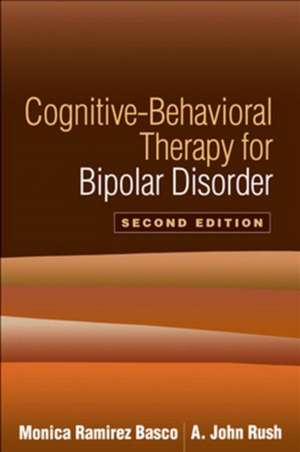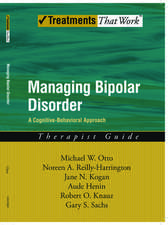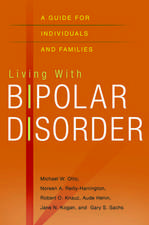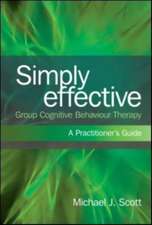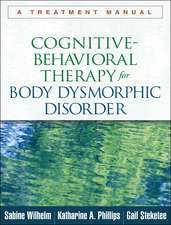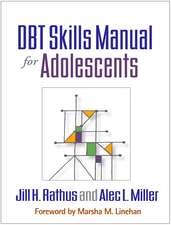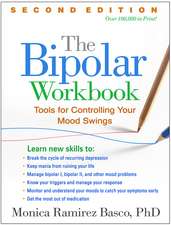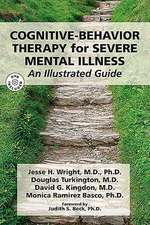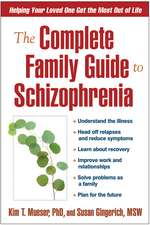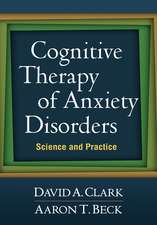Cognitive-Behavioral Therapy for Bipolar Disorder, Second Edition
Autor Monica Ramirez Basco, A. John Rushen Limba Engleză Paperback – 22 mar 2007
From leading scientist-practitioners, this pragmatic, accessible book provides a complete framework for individualized assessment and treatment of bipolar disorder. It addresses the complexities of working with individuals with broadly varying histories and clinical presentations, including those who have been recently diagnosed, those who are symptomatically stable, and those who struggle day to day to achieve symptom remission. Extensive case material illustrates proven strategies for conceptualizing patients' needs and working collaboratively to help them adhere to medication treatments, recognize the early warning signs of manic and depressive episodes, build coping skills, and manage specific symptoms. The second edition is a complete revision of the original volume, updated and restructured to be even more user friendly for clinicians.
Preț: 295.76 lei
Preț vechi: 311.33 lei
-5% Nou
Puncte Express: 444
Preț estimativ în valută:
56.60€ • 58.87$ • 46.73£
56.60€ • 58.87$ • 46.73£
Carte disponibilă
Livrare economică 24 martie-07 aprilie
Livrare express 07-13 martie pentru 31.24 lei
Preluare comenzi: 021 569.72.76
Specificații
ISBN-13: 9781593854843
ISBN-10: 1593854846
Pagini: 324
Ilustrații: illustrations
Dimensiuni: 152 x 229 x 22 mm
Greutate: 0.45 kg
Ediția:2 Rev ed.
Editura: Guilford Publications
Colecția Guilford Press
ISBN-10: 1593854846
Pagini: 324
Ilustrații: illustrations
Dimensiuni: 152 x 229 x 22 mm
Greutate: 0.45 kg
Ediția:2 Rev ed.
Editura: Guilford Publications
Colecția Guilford Press
Public țintă
Professional Practice & DevelopmentCuprins
1. Introduction to the Second Edition
2. Cognitive-Behavioral Therapy for Bipolar Disorder: An Overview
3. Medication Treatments for Bipolar Disorder
4. Enhancing Adherence
5. Compliance Contracts
6. Early Detection to Prevent Relapse
7. Management of Behavioral Symptoms: Trigger Control and Increasing Positives
8. Management of Behavioral Symptoms: Controlling Negatives
9. Management of Cognitive Symptoms: Content Changes
10. Management of Cognitive Symptoms: Process Changes
11. Stress Management
12. Addressing Problems in Interpersonal Communication
13. Putting Together a Treatment Program
Appendix: Protocol for 20 Cognitive-Behavioral Therapy Sessions
2. Cognitive-Behavioral Therapy for Bipolar Disorder: An Overview
3. Medication Treatments for Bipolar Disorder
4. Enhancing Adherence
5. Compliance Contracts
6. Early Detection to Prevent Relapse
7. Management of Behavioral Symptoms: Trigger Control and Increasing Positives
8. Management of Behavioral Symptoms: Controlling Negatives
9. Management of Cognitive Symptoms: Content Changes
10. Management of Cognitive Symptoms: Process Changes
11. Stress Management
12. Addressing Problems in Interpersonal Communication
13. Putting Together a Treatment Program
Appendix: Protocol for 20 Cognitive-Behavioral Therapy Sessions
Notă biografică
Monica Ramirez Basco, PhD, a clinical psychologist, is Associate Director for Science Policy, Planning, and Analysis at the Office of Research on Women’s Health at the National Institutes of Health. She served as Assistant Director for Neuroscience, Mental Health, and Broadening Participation at the White House Office of Science and Technology Policy from 2014 to 2015. Dr. Basco is an internationally recognized expert in cognitive-behavioral therapy and a founding fellow of the Academy of Cognitive and Behavioral Therapies. She was formerly on the faculty of the University of Texas at Arlington, where she was awarded the University of Texas Regents’ Outstanding Teaching Award.
A. John Rush, MD, is Professor of Psychiatry and Vice Chair, Department of Clinical Sciences, at the University of Texas Southwestern Medical Center at Dallas. His work has focused on the diagnosis and psychotherapeutic, psychopharmacological, and somatic treatment of depression and other mood disorders. He has authored 10 books and over 400 journal articles. Dr. Rush's internationally recognized work has received numerous awards. Most recently, his research has focused on longer-term disease management programs, including multistep treatment algorithms for bipolar and major depressive disorders.
Recenzii
Since it is now clear that optimal treatment for the majority of individuals with bipolar disorder requires an approach that integrates pharmacotherapy and psychotherapy, it is reassuring to see this revised, updated manual for one of the key psychotherapeutic modalities. As always, Basco and Rush write with extreme clarity. Readers will benefit from their collective wisdom about ways to intervene in this challenging disorder.--Ellen Frank, PhD, Department of Psychiatry, University of Pittsburgh School of Medicine, Western Psychiatric Institute and Clinic
A thoughtful, readable, and very useful volume. The authors' coverage of issues of compliance and adherence in therapy is comprehensive and compelling, providing a sound basis for preventing relapse. What makes the second edition unique is that the format allows clinicians to apply recommended treatment approaches during different phases of the illness, with patients from the newly diagnosed to those in sustained remission. This book will serve as a useful resource for graduate students as well as more experienced clinicians.--Edward Altman, PsyD, Department of Psychiatry (Retired), University of Illinois at Chicago
The second edition of this definitive work is even more useful than its predecessor. Focusing on techniques for patients at different stages of their illness and acceptance, this is a 'must' for all clinicians treating bipolar disorder. The best psychoeducational and cognitive-behavioral strategies for helping this population are described and integrated into a coherent framework. The book is full of carefully structured charts, case examples, and patient assignments that will enable clinicians to successfully employ these critically important treatment principles and practices.--Robert Morton Post, MD, Biological Psychiatry Branch, National Institute of Mental Health
Two experts, including John Rush, one of the pioneers in CBT, have made an excellent book even better....This text is more user-friendly, and has extensive illustrative case material and descriptions of strategic (goal-focused) and technical interventions. The authors take the clinician through the course of the illness and recommend particular interventions for each stage or clinical manifestation of bipolar disorder. For the clinician and teacher of clinical issues, this should be a required text./m-/Arthur Freeman, EdD, ABPP, Behavioral Science Book Service Advisory Board Member
-A thoughtful, readable, and very useful volume. The authors' coverage of issues of compliance and adherence in therapy is comprehensive and compelling, providing a sound basis for preventing relapse. What makes the second edition unique is that the format allows clinicians to apply recommended treatment approaches during different phases of the illness, with patients from the newly diagnosed to those in sustained remission. This book will serve as a useful resource for graduate students as well as more experienced clinicians.--Edward Altman, PsyD, Department of Psychiatry (Retired), University of Illinois at Chicago
The second edition of this definitive work is even more useful than its predecessor. Focusing on techniques for patients at different stages of their illness and acceptance, this is a 'must' for all clinicians treating bipolar disorder. The best psychoeducational and cognitive-behavioral strategies for helping this population are described and integrated into a coherent framework. The book is full of carefully structured charts, case examples, and patient assignments that will enable clinicians to successfully employ these critically important treatment principles and practices.--Robert Morton Post, MD, Biological Psychiatry Branch, National Institute of Mental Health
Two experts, including John Rush, one of the pioneers in CBT, have made an excellent book even better....This text is more user-friendly, and has extensive illustrative case material and descriptions of strategic (goal-focused) and technical interventions. The authors take the clinician through the course of the illness and recommend particular interventions for each stage or clinical manifestation of bipolar disorder. For the clinician and teacher of clinical issues, this should be a required text./m-/Arthur Freeman, EdD, ABPP, Behavioral Science Book Service Advisory Board Member
A truly practical resource grounded in a real-world context....A comprehensive guide to the treatment of bipolar disorder from the CBT framework, and which would serve any therapist extremely well in a multitude of settings, both psychological and in more medically oriented multidisciplinary teams. As a resource for therapists specializing in bipolar disorder, or for those wondering how to apply their CBT skills to symptoms of depression and mania, this would be a valuable addition to any bookshelf.
--Behavioural and Cognitive Psychotherapy, 2/14/2007ƒƒI found this book extremely helpful in adding new techniques to my therapeutic armamentarium. I recommend it highly for both the beginning and experienced therapist.
--Bulletin of the Menninger Clinic, 2/14/2007ƒƒBasco and Rush provide an easy-to-follow and flexible set of techniques for treatment of bipolar disorder....For beginning clinicians and practitioners who prefer to work using a more structured approach, a treatment protocol is provided in the Appendix....Vignettes are offered throughout the book to illustrate how to apply the techniques to different types of patients in different stages of the illness.
--Cognitive Behavioral Therapy Book Reviews, 2/14/2007Descriere
From leading scientist-practitioners, this pragmatic, accessible book provides a complete framework for individualized assessment and treatment of bipolar disorder. It addresses the complexities of working with individuals with broadly varying histories and clinical presentations, including those who have been recently diagnosed, those who are symptomatically stable, and those who struggle day to day to achieve symptom remission. Extensive case material illustrates proven strategies for conceptualizing patients' needs and working collaboratively to help them adhere to medication treatments, recognize the early warning signs of manic and depressive episodes, build coping skills, and manage specific symptoms. The second edition is a complete revision of the original volume, updated and restructured to be even more user friendly for clinicians.
